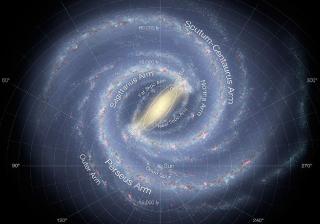Bibcode
López-Corredoira, M.; Lee, Y.-W.; Garzón, F.; Lim, D.
Referencia bibliográfica
Astronomy and Astrophysics, Volume 627, id.A3, 5 pp.
Fecha de publicación:
7
2019
Revista
Número de citas
10
Número de citas referidas
9
Descripción
Context. Claims of an X-shaped Galactic bulge were based on the
assumption of red clump stars as standard candles in some lines of sight
crossing the off-plane bulge. However, some doubts have been cast on
whether the two peaks in star counts along the line of sight really
represent a double peak in the density distribution, or whether there is
something wrong with the assumption of a unique constant absolute
magnitude for all of these stars. Aims: With the advent of
Gaia-DR2 parallaxes in combination with near-infrared VISTA-VVV data, we
are able to check which of the hypotheses is correct. Methods: We
calculated the median absolute magnitude MK corresponding to
both peaks of putative red clumps in seven lines of sight with the
lowest extinction in the interesting coordinates' range. Results:
The difference between the absolute magnitude of the bright and the
faint peak is ΔMK ≈ 0.4. The selected stars in both
peaks cannot be represented by the same red clump giants with constant
MK ≈ -1.6. Conclusions: The hypothesis that the
bulge contains an X-shape is based on the assumption that the faint and
bright peaks of the density distribution towards the bulge are dominated
by standard red clump stars. However, we show that both the faint and
bright peaks cannot be dominated by standard red clump stars
simultaneously.
Proyectos relacionados

Morfología y dinámica de la Vía Láctea
El Proyecto se estructura en dos partes, diferenciadas pero complementarias: morfología y dinámica. El estudio detallado de la morfología de la Vía Láctea pretende proveer una base de datos de distribución estelar en las regiones más alejadas y extintas de nuestra Galaxia, mediante el desarrollo de modelos semiempíricos a partir de la información
Martín
López Corredoira